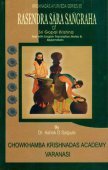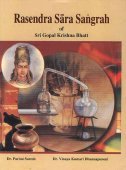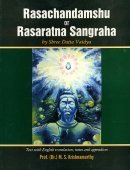Masurika, Masūrikā: 12 definitions
Introduction:
Masurika means something in Hinduism, Sanskrit, Marathi, Hindi, biology. If you want to know the exact meaning, history, etymology or English translation of this term then check out the descriptions on this page. Add your comment or reference to a book if you want to contribute to this summary article.
In Hinduism
Ayurveda (science of life)
Kalpa (Formulas, Drug prescriptions and other Medicinal preparations)
Source: Shodhganga: Edition translation and critical study of yogasarasamgrahaMasūrikā (मसूरिका) refers to “small pox” and is one of the various diseases mentioned in the 15th-century Yogasārasaṅgraha (Yogasara-saṅgraha) by Vāsudeva: an unpublished Keralite work representing an Ayurvedic compendium of medicinal recipes. The Yogasārasaṃgraha [mentioning masūrikā] deals with entire recipes in the route of administration, and thus deals with the knowledge of pharmacy (bhaiṣajya-kalpanā) which is a branch of pharmacology (dravyaguṇa).
Unclassified Ayurveda definitions
Source: Wisdom Library: Āyurveda and botanyMasūrikā (मसूरिका) is another word for Masūra (Lens culinaris “lentil”) according to the Bhāvaprakāśa, which is a 16th century medicinal thesaurus authored by Bhāvamiśra. The term is used throughout Ayurvedic literature.

Āyurveda (आयुर्वेद, ayurveda) is a branch of Indian science dealing with medicine, herbalism, taxology, anatomy, surgery, alchemy and related topics. Traditional practice of Āyurveda in ancient India dates back to at least the first millenium BC. Literature is commonly written in Sanskrit using various poetic metres.
Biology (plants and animals)
Source: Google Books: CRC World Dictionary (Regional names)Masurika in India is the name of a plant defined with Lens culinaris in various botanical sources. This page contains potential references in Ayurveda, modern medicine, and other folk traditions or local practices It has the synonym Cicer lens Willd. (among others).
Example references for further research on medicinal uses or toxicity (see latin names for full list):
· Atoll Res. Bull. (1983)
· Methodus Plantas Horti Botanici (1794)
· A Revised Handbook to the Flora of Ceylon (1980)
· Species Plantarum.
· Vorlesungen der Churpfälzischen physicalisch-öconomischen Gesellschaft (1787)
· New Zealand Journal of Botany (1980)
If you are looking for specific details regarding Masurika, for example pregnancy safety, chemical composition, health benefits, diet and recipes, extract dosage, side effects, have a look at these references.

This sections includes definitions from the five kingdoms of living things: Animals, Plants, Fungi, Protists and Monera. It will include both the official binomial nomenclature (scientific names usually in Latin) as well as regional spellings and variants.
Languages of India and abroad
Marathi-English dictionary
Source: DDSA: The Molesworth Marathi and English Dictionarymasūrikā (मसूरिका) [or मसूरी, masūrī].—f S pop. masuṛyādēvī f pl A variety of the small pox. The pocks resemble the pulse masūra.
Source: DDSA: The Aryabhusan school dictionary, Marathi-Englishmasūrikā (मसूरिका).—f A variety of the small- pox.
Marathi is an Indo-European language having over 70 million native speakers people in (predominantly) Maharashtra India. Marathi, like many other Indo-Aryan languages, evolved from early forms of Prakrit, which itself is a subset of Sanskrit, one of the most ancient languages of the world.
Sanskrit dictionary
Source: DDSA: The practical Sanskrit-English dictionaryMasūrikā (मसूरिका).—
1) A kind of small-pox (erection of small pustules).
2) A mosquito-curtain.
3) A procuress, bawd.
Source: Cologne Digital Sanskrit Dictionaries: Shabda-Sagara Sanskrit-English DictionaryMasūrikā (मसूरिका).—f.
(-kā) 1. A bawd, a procuress. 2. Small pox. 3. A musquitocurtain. E. masūrā a whore, aff. kan, fem. form.
Source: Cologne Digital Sanskrit Dictionaries: Benfey Sanskrit-English DictionaryMasūrikā (मसूरिका).—i. e. masūra + ka, f. A procuress.
Source: Cologne Digital Sanskrit Dictionaries: Monier-Williams Sanskrit-English Dictionary1) Masūrikā (मसूरिका):—[from masūraka > masura] f. lentil, [cf. Lexicographers, esp. such as amarasiṃha, halāyudha, hemacandra, etc.]
2) [v.s. ...] eruption of lentil-shaped pustules, smallpox, [Suśruta]
3) [v.s. ...] a mosquito-curtain, [cf. Lexicographers, esp. such as amarasiṃha, halāyudha, hemacandra, etc.]
4) [v.s. ...] a procuress, [cf. Lexicographers, esp. such as amarasiṃha, halāyudha, hemacandra, etc.]
Source: Cologne Digital Sanskrit Dictionaries: Yates Sanskrit-English DictionaryMasūrikā (मसूरिका):—(kā) 1. f. A bawd; small. pox.
Sanskrit, also spelled संस्कृतम् (saṃskṛtam), is an ancient language of India commonly seen as the grandmother of the Indo-European language family (even English!). Closely allied with Prakrit and Pali, Sanskrit is more exhaustive in both grammar and terms and has the most extensive collection of literature in the world, greatly surpassing its sister-languages Greek and Latin.
Hindi dictionary
Source: DDSA: A practical Hindi-English dictionaryMasūrikā (मसूरिका):—(nf) measles.
...
Kannada-English dictionary
Source: Alar: Kannada-English corpusMasūrika (ಮಸೂರಿಕ):—[noun] = ಮಸೂರು [masuru].
Kannada is a Dravidian language (as opposed to the Indo-European language family) mainly spoken in the southwestern region of India.
See also (Relevant definitions)
Relevant text
Search found 8 books and stories containing Masurika, Masūrikā, Masūrika; (plurals include: Masurikas, Masūrikās, Masūrikas). You can also click to the full overview containing English textual excerpts. Below are direct links for the most relevant articles:
The Garuda Purana (by Manmatha Nath Dutt)
Chapter CLXXVIII - The Nidanam of Variola < [Dhanvantari Samhita]
Chapter CLIX - The Nidanam of diseases of the Urinary organs (Pramehas) < [Dhanvantari Samhita]
Atharvaveda and Charaka Samhita (by Laxmi Maji)
Yogaratnākara (Āyurveda book) < [Chapter 1 - Introduction]
Rasendrasāra Saṅgraha (Āyurveda book) < [Chapter 1 - Introduction]
The Padma Purana (by N.A. Deshpande)
Chapter 94 - Restraints during the Kārtika Vow < [Section 6 - Uttara-Khaṇḍa (Concluding Section)]
Chapter 21 - Restrictions While Observing the Kārtika Vow < [Section 4 - Brahma-khaṇḍa (Section on Brahman)]
Sushruta Samhita, volume 2: Nidanasthana (by Kaviraj Kunja Lal Bhishagratna)
The Shiva Purana (by J. L. Shastri)
Chapter 7 - The rite of listening to Śivapurāṇa: Injunctions and prohibitions < [Śivapurāṇa-māhātmya]
Sushruta Samhita, volume 4: Cikitsasthana (by Kaviraj Kunja Lal Bhishagratna)
Related products



